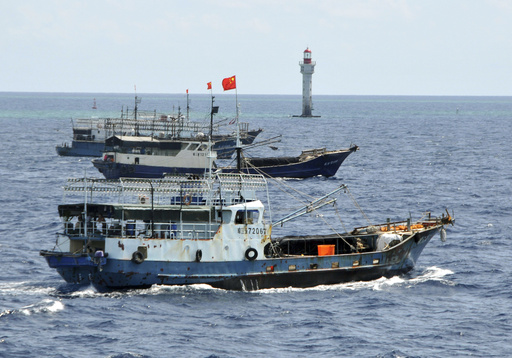In a report unveiled on Monday, a fleet of Chinese fishing vessels has allegedly employed North Korean crews from 2019 to 2024, flouting United Nations bans. This practice reportedly led to severe human rights abuses, with individuals trapped at sea for lengthy periods spanning several years. The Environmental Justice Foundation (EJF), a London-based NGO focusing on environmental and human rights, identified the involvement of North Korean crew members on 12 Chinese tuna long-liners in the southwest Indian Ocean. The findings heavily rely on interviews conducted with 19 Indonesian and Filipino crew members who worked alongside North Koreans.
The testimonies from these Indonesian and Filipino crew members indicate deliberate attempts to conceal the presence of North Korean workers on board. Many North Koreans were forced to endure up to a decade at sea, often without touching land. The report emphasized that this situation represents a significant instance of forced labor within a global fishing industry known for existing abuses.
Transferring North Korean workers between vessels was a method used to prevent their return to land. The EJF reported that the North Korean crews were denied mobile phone access and prohibited from disembarking during port stops. However, the foundation could not provide an estimated number of North Koreans engaged in such activities due to consistent transfers.
Employing North Korean fishermen constitutes a breach of 2017 U.N. Security Council resolutions. These resolutions required member states to refrain from issuing work permits to North Koreans and mandated repatriation of all North Korean labor back to their homeland by the end of 2019. The sanctions were in response to North Korea’s nuclear and ballistic missile tests, contravening previous U.N. mandates.
Additionally, the involvement of North Korean laborers on these Chinese vessels seems to have circumvented legal regulations in the U.K. and the European Union, intending to prevent North Korean goods from infiltrating their supply chains. The EJF also unearthed evidence of suspect vessels transporting fish from these Chinese ships into major Asian markets such as Japan, Taiwan, and South Korea.
China, along with Russia, faces accusations of not fully implementing U.N. sanctions against North Korea and has resisted U.S.-drafted initiatives aimed at intensifying sanctions in the wake of North Korea’s continued prohibited weapons testing. Asked about the EJF findings, a spokesperson for the Chinese Foreign Ministry, Lin Jian, mentioned during a briefing that he was unaware of the report but stated that China adheres to legal regulations in its offshore fishing operations. He further stressed that any collaboration with North Korea is conducted in line with international law.
This revelation marks the first public documentation of North Korean laborers on distant-water fishing vessels. Before the 2019 U.N. deadline, thousands of North Koreans were reportedly employed abroad, predominantly in Chinese factories and restaurants, and Russian construction sites and logging camps, to generate foreign currency for their government. These workers, typically under stringent supervision by North Korean security personnel, worked over 12 hours daily. Their earnings, often slashed with only a minimal portion retained, supported the North Korean government.
Despite prohibitions, officials and experts from South Korea believe many North Koreans remain economically active worldwide. These workers reportedly transmit substantial funds back to North Korea, purportedly financing the nation’s nuclear ambitions.


